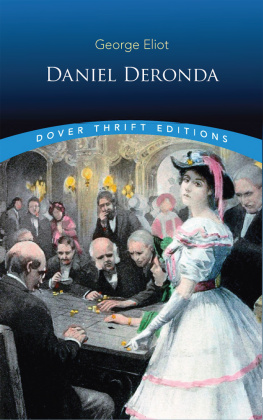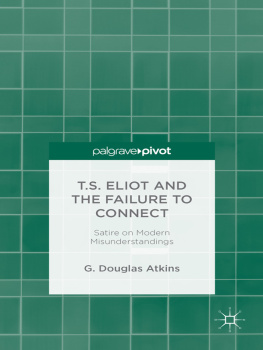Eliot George - Daniel Deronda
Here you can read online Eliot George - Daniel Deronda full text of the book (entire story) in english for free. Download pdf and epub, get meaning, cover and reviews about this ebook. year: 2017, publisher: Dover Publications, genre: Prose. Description of the work, (preface) as well as reviews are available. Best literature library LitArk.com created for fans of good reading and offers a wide selection of genres:
Romance novel
Science fiction
Adventure
Detective
Science
History
Home and family
Prose
Art
Politics
Computer
Non-fiction
Religion
Business
Children
Humor
Choose a favorite category and find really read worthwhile books. Enjoy immersion in the world of imagination, feel the emotions of the characters or learn something new for yourself, make an fascinating discovery.
- Book:Daniel Deronda
- Author:
- Publisher:Dover Publications
- Genre:
- Year:2017
- Rating:5 / 5
- Favourites:Add to favourites
- Your mark:
- 100
- 1
- 2
- 3
- 4
- 5
Daniel Deronda: summary, description and annotation
We offer to read an annotation, description, summary or preface (depends on what the author of the book "Daniel Deronda" wrote himself). If you haven't found the necessary information about the book — write in the comments, we will try to find it.
Daniel Deronda — read online for free the complete book (whole text) full work
Below is the text of the book, divided by pages. System saving the place of the last page read, allows you to conveniently read the book "Daniel Deronda" online for free, without having to search again every time where you left off. Put a bookmark, and you can go to the page where you finished reading at any time.
Font size:
Interval:
Bookmark:
D ANIEL D ERONDA

George Eliot
D OVER P UBLICATIONS , I NC .
M INEOLA , N EW Y ORK
DOVER THRIFT EDITIONS
G ENERAL E DITOR : S USAN L. R ATTINER E DITOR OF T HIS V OLUME : J ANET B. K OPITO
Bibliographical Note
This Dover edition, first published in 2017, is an unabridged republication of a standard edition.
International Standard Book Number
ISBN-13: 978-0-486-81244-1
ISBN-10: 0-486-81244-8
Manufactured in the United States by LSC Communications 81244801 2017
www.doverpublications.com
CONTENTS.
Let thy chief terror be of thine own soul:
There, mid the throng of hurrying desires
That trample oer the dead to seize their spoil,
Lurks vengeance, footless, irresistible
As exhalations laden with slow death,
And oer the fairest troop of captured joys
Breathes pallid pestilence.
DANIEL DERONDA
BOOK I.
THE SPOILED CHILD.

CHAPTER I.
Men can do nothing without the make-believe of a beginning. Even Science, the strict measurer, is obliged to start with a make-believe unit, and must fix on a point in the stars unceasing journey when his sidereal clock shall pretend that time is at Nought. His less accurate grandmother Poetry has always been understood to start in the middle; but on reflection it appears that her proceeding is not very different from his; since Science, too, reckons backwards as well as forwards, divides his unit into billions, and with his clock-finger at Nought really sets off in medias res. No retrospect will take us to the true beginning; and whether our prologue be in heaven or on earth, it is but a fraction of that all-presupposing fact with which our story sets out.
W AS she beautiful or not beautiful ? and what was the secret of form or expression which gave the dynamic quality to her glance ? Was the good or the evil genius dominant in those beams ? Probably the evil; else why was the effect that of unrest rather than of undisturbed charm? Why was the wish to look again felt as coercion and not as a longing in which the whole being consents?
She who raised these questions in Daniel Derondas mind was occupied in gambling: not in the open air under a southern sky, tossing coppers on a ruined wall, with rags about her limbs; but in one of those splendid resorts which the enlightenment of ages has prepared for the same species of pleasure at a heavy cost of gilt mouldings, dark-toned colour and chubby nudities, all correspondingly heavyforming a suitable condenser for human breath belonging, in great part, to the highest fashion, and not easily procurable to be breathed in elsewhere in the like proportion, at least by persons of little fashion.
It was near four oclock on a September day, so that the atmosphere was well-brewed to a visible haze. There was deep stillness, broken only by a light rattle, a light chink, a small sweeping sound, and an occasional monotone in French, such as might be expected to issue from an ingeniously constructed automaton. Round two long tables were gathered two serried crowds of human beings, all save one having their faces and attention bent on the tables. The one exception was a melancholy little boy, with his knees and calves simply in their natural clothing of epidermis, but for the rest of his person in a fancy dress. He alone had his face turned towards the doorway, and fixing on it the blank gaze of a bedizened child stationed as a masquerading advertisement on the platform of an itinerant show, stood close behind a lady deeply engaged at the roulette-table.
About this table fifty or sixty persons were assembled, many in the outer rows, where there was occasionally a deposit of new comers, being mere spectators, only that one of them, usually a woman, might now and then be observed putting down a five-franc piece with a simpering air, just to see what the passion of gambling really was. Those who were taking their pleasure at a higher strength, and were absorbed in play, showed very distant varieties of European type: Livonian and Spanish, Graeco-Italian and miscellaneous German, English aristocratic and English plebeian. Here certainly was a striking admission of human equality. The white bejewelled fingers of an English countess were very near touching a bony, yellow, crablike hand stretching a bared wrist to clutch a heap of coina hand easy to sort with the square, gaunt face, deep-set eyes, grizzled eyebrows, and ill-combed scanty hair which seemed a slight metamorphosis of the vulture. And where else would her ladyship have graciously consented to sit by that dry-lipped feminine figure prematurely old, withered after short bloom like her artificial flowers, holding a shabby velvet reticule before her, and occasionally putting in her mouth the point with which she pricked her card? There too, very near the fair countess, was a respectable London tradesman, blond and soft-handed, his sleek hair scrupulously parted behind and before, conscious of circulars addressed to the nobility and gentry, whose distinguished patronage enabled him to take his holidays fashionably, and to a certain extent in their distinguished company. Not his the gamblers passion that nullifies appetite, but a well-fed leisure, which in the intervals of winning money in business and spending it showily, sees no better resource than winning money in play and spending it yet more showilyreflecting always that Providence had never manifested any disapprobation of his amusement, and dispassionate enough to leave off if the sweetness of winning much and seeing others lose had turned to the sourness of losing much and seeing others win. For the vice of gambling lay in losing money at it. In his bearing there might be something of the tradesman, but in his pleasures he was fit to rank with the owners of the oldest titles. Standing close to his chair was a handsome Italian, calm, statuesque, reaching across him to place the first pile of napoleons from a new bagful just brought him by an envoy with a scrolled mustache. The pile was in half a minute pushed over to an old bewigged woman with eyeglasses pinching her nose. There was a slight gleam, a faint mumbling smile about the lips of the old woman; but the statuesque Italian remained impassive, and probably secure in an infallible system which placed his foot on the neck of chanceimmediately prepared a new pile. So did a man with the air of an emaciated beau or worn-out libertine, who looked at life through one eyeglass, and held out his hand tremulously when he asked for change. It could surely be no severity of system, but rather some dream of white crows, or the induction that the eighth of the month was lucky, which inspired the fierce yet tottering impulsiveness of his play.
But while every single player differed markedly from every other, there was a certain uniform negativeness of expression which had the effect of a maskas if they had all eaten of some root that for the time compelled the brains of each to the same narrow monotony of action.
Derondas first thought when his eyes fell on this scene of dull, gas-poisoned absorption was that the gambling of Spanish shepherd-boys had seemed to him more enviable:so far Rousseau might be justified in maintaining that art and science had done a poor service to mankind. But suddenly he felt the moment become dramatic. His attention was arrested by a young lady who, standing at an angle not far from him, was the last to whom his eyes travelled. She was bending and speaking English to a middle-aged lady seated at play beside her; but the next instant she returned to her play, and showed the full height of a graceful figure, with a face which might possibly be looked at without admiration, but could hardly be passed with indifference.
Next pageFont size:
Interval:
Bookmark:
Similar books «Daniel Deronda»
Look at similar books to Daniel Deronda. We have selected literature similar in name and meaning in the hope of providing readers with more options to find new, interesting, not yet read works.
Discussion, reviews of the book Daniel Deronda and just readers' own opinions. Leave your comments, write what you think about the work, its meaning or the main characters. Specify what exactly you liked and what you didn't like, and why you think so.









